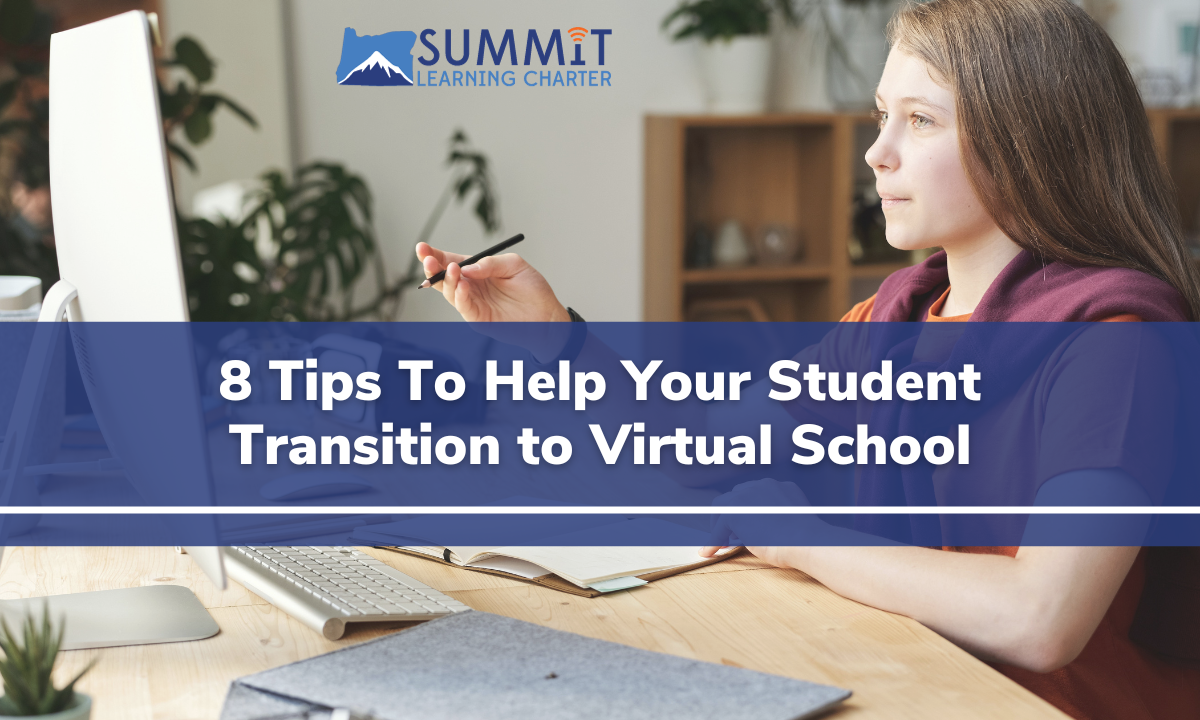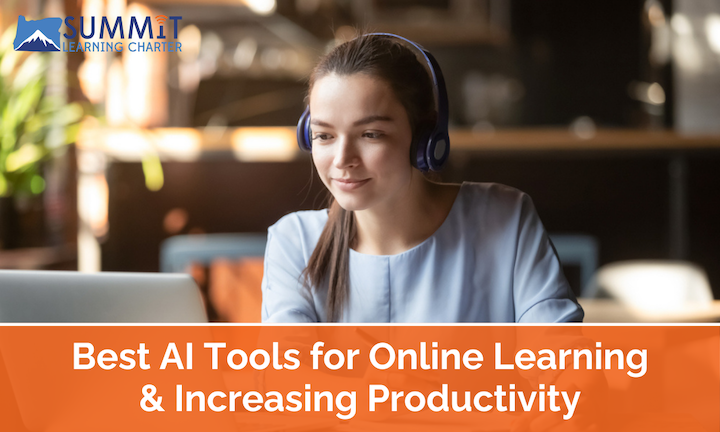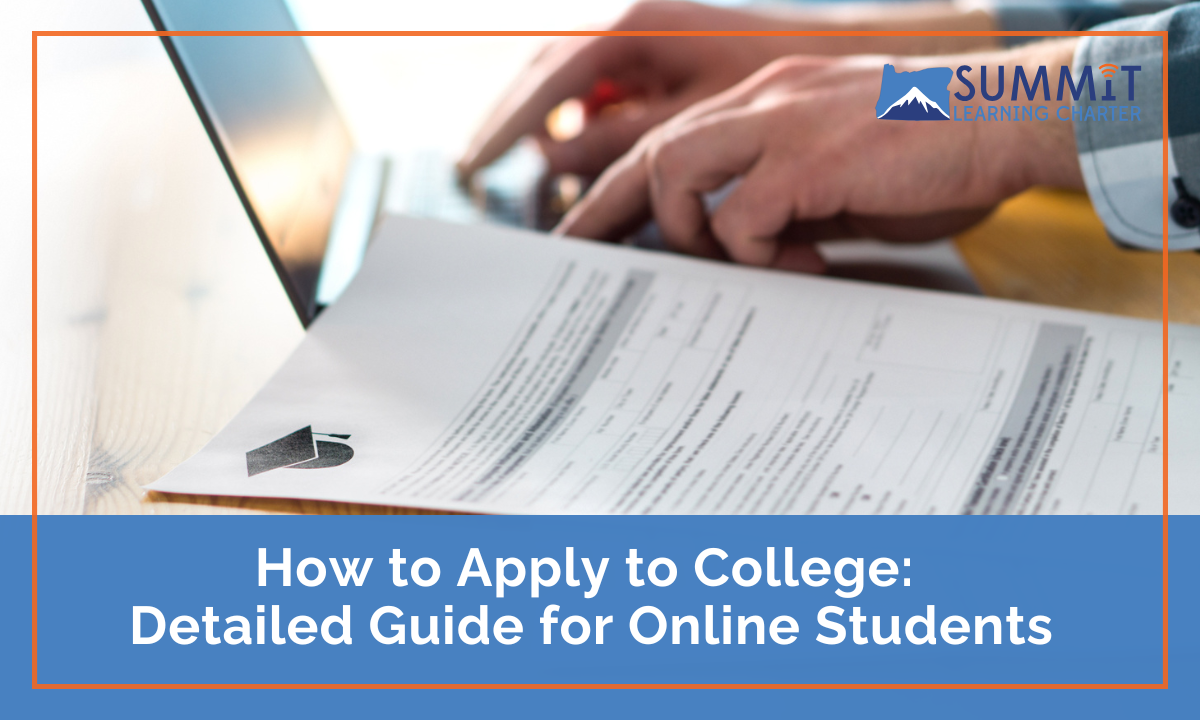
8 Tips To Help Your Student Transition to Virtual School
Virtual schooling offers a range of benefits to students. Learning online can provide students with greater flexibility over their schedules, more diverse academic opportunities, and the chance to gain essential skills like self-discipline and time management. But transitioning to online learning can be intimidating for students and their support systems.
Fortunately, you’re far from alone on this journey! There are many resources available to help make the transition to online school smooth and free of stress and confusion.
At SLC, many of our students enroll in our online learning programs with no previous experience outside of traditional school. We’re here to help you and your student adjust to the online school curriculum and make strong connections with the rest of the virtual learning community. Here are our top tips to get you started!
1. Prepare Your Learning Environment for Success
Having an organized, quiet, and comfortable learning environment is absolutely essential. As a Learning Coach, providing a dedicated space where your student can focus on coursework and attend class without distraction is one of the best ways to ensure a successful transition.
There are many ways to create a positive learning environment that encourages productivity and reduces stress. Regardless of where your student completes their work, their learning space should have:
- A strong, reliable internet connection
- A desk with a computer and upright chair
- A visible and organized study board or schedule
- Comfortable seating such as a sofa or recliner for reading and independent study
2. Find Essential Learning Tools
At SLC, we provide every student with a laptop and access to a variety of learning programs and platforms like Canvas, Zoom, Edgenuity, and Google Apps. This ensures you have the chance to engage with tools that work for your student’s individual learning style, preferences, and educational needs.
We also encourage students and Learning Coaches to seek out additional tools that help them stay on track and enable optimal learning. Some helpful supplemental learning tools may include:
- An online calendar, wall calendar, and/or planner
- Flash cards
- Structured notebooks
- Colorful pens
- Alarms to time study sessions, breaks, and practice tests
- Noise-canceling headphones
3. Learn Smart Study Techniques
 For many students, using study methods that don’t cater to their individual learning style can significantly limit their academic potential and make the learning process less enjoyable. Utilizing smart study strategies to help students as they begin virtual school can make the process easier and more effective.
For many students, using study methods that don’t cater to their individual learning style can significantly limit their academic potential and make the learning process less enjoyable. Utilizing smart study strategies to help students as they begin virtual school can make the process easier and more effective.
Here are a few smart study techniques your student can try:
- Take regular breaks to allow information to absorb.
- Once you learn a new concept, think about how you would explain it to a younger student in simplified terms.
- Listen to instrumental music, as this can increase focus and retention for many students.
- Read a small section of your textbook, close it, and recite the information in your own words.
- Join a study group to work alongside your peers.
4. Decide How Much Support and Involvement Your Student Requires
Virtual schooling necessitates more independent learning and self-motivation when compared to traditional classrooms, but students still benefit from engaged support and guidance from an invested source. That’s why the role of a Learning Coach is so valuable.
At SLC, we offer basic recommendations regarding daily time commitments for Learning Coaches depending on the age of the student. In general, we suggest that Learning Coaches commit to:
- 5-6 hours for elementary students
- 2-3 hours for middle school students
- 1-2 hours for high school students
While these estimates can serve as a helpful starting point, your student will ultimately have their own individual needs. Communicate with your student to determine how much involvement is most conducive to their learning.
5. Establish a Routine
When transitioning to online learning, one of the most important steps you need to take is to create structure. In traditional learning environments, the school schedule is set out by administrators and strictly enforced by staff and teachers. Virtual schools still have structured courses and assignments, but learning online requires students and their Learning Coaches to take an active role in establishing a routine – and then stick to it!
At SLC, we encourage you to build a structured routine as early as possible in your online-learning journey. Here are some tips for success:
- Use a calendar.
- Take note of your instructors’ office hours.
- Attend your homeroom every single week.
- Keep careful track of any assigned times for instruction required in your courses.
- Plan out each week in advance and set daily goals.
- Dedicate at least an hour per day to each course.
- Set a specific time to begin the school day as well as scheduled breaks.
Related: Pros and Cons of Traditional vs Online High School
6. Learn How to Stay Engaged in Classrooms and Build Relationships

It’s a common misconception that online learners are less socially adept than students who attend traditional schools. In fact, research indicates that some aspects of online education actually promote improved socialization skills among students. However, making connections with teachers, mentors, and peers in an online learning environment does require more active effort and participation on the part of individual students.
Here are some tips to help your student stay engaged in their classes and build strong connections with instructors and peers as they transition to online school:
- Look for elective courses that spark genuine curiosity and excitement from your student.
- Learn how you can get involved and support your student’s online teachers.
- Help your student gain confidence to ask questions during instruction.
- Encourage your student to attend their instructors’ office hours.
- Find out how you can help your online learner build socialization skills.
- Consider participating in extracurriculars for online students.
7. Know What Online Learning Challenges You May Encounter
Transitioning to online learning is a big deal. While there’s a lot you can do to support your student and help make the switch as smooth and stress-free as possible, every learning environment comes with challenges. Virtual schooling is no exception.
Some of the challenges and obstacles that you may face during the transition to online school include:
- Technical issues
- Distractions and problems with staying focused
- Struggles with motivation
- Missing friends or feeling isolated
- Trouble with effective time-management
Becoming a successful online student is a process, and one of the essential traits in a great Learning Coach is patience. Both you and your student will need some time to learn how to adapt to the new environment, schedule, and expectations. But you’re not alone. Take advantage of outside resources and advice from those around you, and don’t give up! At SLC, we’re here to help.
8. Communicate with Your Teachers and Ask Questions
Communicating with teachers in online school is vital to the transition from traditional education. Students are best served when they, their Learning Coaches, and their teachers collaborate regularly and effectively. Discussing your concerns and goals with instructors can provide you with the tools you need to help your student succeed.
It’s also important to encourage your student to speak directly with their teachers when they have a question or are struggling with a certain concept. At SLC, we offer a variety of online tutoring and support services to help your student stay on track.
Let Us Help Make Your Transition to Online School Smooth!
 At Summit Learning Charter, we care deeply about each and every one of our students and their support systems. We know there’s no one-size-fits-all approach to education that works for everyone. We celebrate the diversity of our learning community, and we’re here to provide personalized and caring support, resources, and guidance as you navigate the transition to online school.
At Summit Learning Charter, we care deeply about each and every one of our students and their support systems. We know there’s no one-size-fits-all approach to education that works for everyone. We celebrate the diversity of our learning community, and we’re here to provide personalized and caring support, resources, and guidance as you navigate the transition to online school.
We’re here to answer all your questions and create a plan that prioritizes your student’s unique needs, interests, and goals. Learn more about SLC’s virtual academy and contact us to get started.



